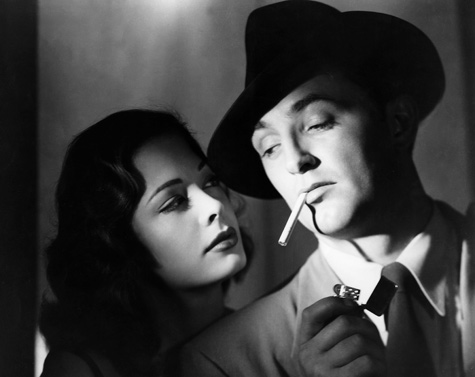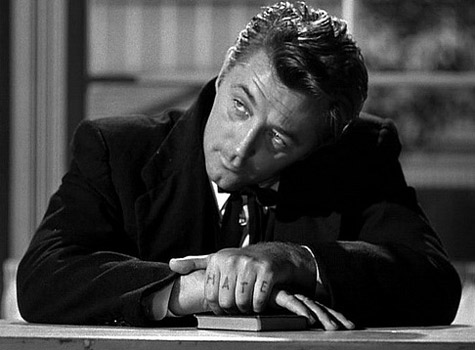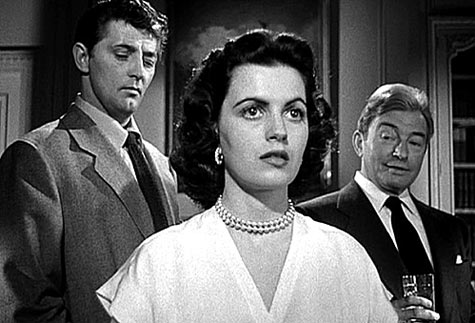
Robert Mitchum is the King of Film Noir. Not only was he one of the great leading men (starring in masterpieces like Out of the Past), he was one of the great villains (issuing chilling turns in The Night of the Hunter and Cape Fear). He made some of the darkest noirs (Angel Face) and some of the goofiest (Her Kind of Man). He got to the party early, at the dawn of the classic era, starring in his first noir film, When Strangers Marry, in 1944. And he stayed longer at the party than anyone else, notching up late career hits like The Friends of Eddie Coyle in 1973 and Farewell My Lovely in 1975. Mitchum was the King.
There are, of course, other contenders for the title. Bogart’s greatness is beyond debate. Robert Ryan was recently crowned king by no less an august organization as the Film Noir Foundation. And a pretty solid case could be made for either Sterling Hayden or Charles McGraw. These men were all great stars, and each, in his own way, is essential to film noir.
For my money, though, Mitchum seemed to embody the ethos of noir better than anyone else.
To talk about his screen persona is to talk about his style, of course, but what ties his greatest performances together is a consistent worldview. Mitchum was the great cinematic poet of life’s essential meaninglessness. If he lacked the anxiety and neurosis that drove Bogart or Robert Ryan (his chief contenders for the title), then so much the better. The King wears his crown with a certain amount of grace. His biographer, Lee Server, summed up this attitude when he swiped one of the king’s great lines (from Out of the Past) for the title of his 2002 biographyof the actor: Baby, I Don’t Care.

He made plenty of low budget oaters (his first film was Hoppy Serves a Writ in 1943) before he made William Castle’s When Strangers Marry at Monogram in 1944. He’s in his stud prime in the film, about twenty-seven years old, with shoulders as wide as a beer truck, and the movie gives him a scene in a sauna for no other reason than to have him take off his shirt and get wet. If the Mitchum persona hasn’t fully gelled yet, in part because of a spotty script, one’s still struck by just how Mitchum he seems already. Here’s the king, fresh off the range from shooting five-day cheapie Westerns, in his first film noir, and he already owns the screen.
He never left Westerns behind completely, but noir was his natural habitat. He exuded insolence and danger, and something in the jazzy late-night rhythms of noir seemed a perfect fit for his sleepy-eyed detachment. For the rest of the classic period, Mitchum was synonymous with film noir. Here then is a brief introduction to his work.
Essential Mitchum Noir:
1. When Strangers Marry (aka Betrayed) (1944): Film historian Don Miller famously called it “the finest B-movie ever made.” That’s a bit of an overstatement, but it is a B-movie full of style and dread. And, of course, Mitchum in the flowering of his glory.
2. Crossfire (1947): Battle of the Roberts! Mitchum versus Ryan in this story of a wide-eyed racist solider (Ryan) who kills a Jewish civilian and then frames a fellow solider for the crime. Mitchum is too laid back to be believable as an army sergeant trying to crack the case, but he glides through the role with the effortless charisma he brought to so much of his work (which is to say that while he’s never really believable as Sgt. Keeley he is distinctly Robert Mitchum, which ain’t bad). Added bonus: the first film noir appearance of the glorious Gloria Grahame.
3. Out of the Past (1947): Film noir never produced a better movie than Jacques Tourneur’s romantic masterpiece starring Mitchum as a private eye helplessly drawn to a coldhearted beauty played by Jane Greer. “I don’t want to die,” she tells him. “Neither do I, baby,” he replies “but if I have to, I’m gonna die last.” Pretty much a perfect movie, and Mitchum’s career defining role.

4. Where Danger Lives (1950): Mitchum was the king, sure, but he was also a chump. Couldn’t say no to the wrong kind of woman. Here he’s beguiled by full tilt psycho Faith Domergue, and he pays hard for his obsession. Beautifully directed by the great John Farrow, gorgeously shot by master cinematographer Nicholas Musuraca, the film culminates in a thrillingly brutal showdown in a sleazy border town hotel room.
5. Angel Face (1952): One of the bleakest of all noirs (which, you know, is saying a lot). Mitchum meets sexy Jean Simmons and she destroys him. It is the consummate noir storyline: an ordinary man meets a beautiful woman. He’s so intoxicated by her he can’t see that she’s serious trouble. Like a siren, she lures him to his doom. He’s not a bad man, just a weak one, and because of his weakness he will earn his destruction. Mitchum is the ultimate weak man. He’s smarter than us. Better looking than us. Cooler than us by far. And he’s still no match for the femme fatale.
6. The Night of the Hunter (1955): Mitchum’s last great noir of the classic era is one of his best. He plays a woman-murdering preacher with LOVE and HATE tattooed on his knuckles. He terrorizes two small children to find some missing money. He kills their mother and dumps her in a lake. He is scary. The role was a revelation for some audiences—proof that the handsome leading man had a grotesque darkness inside him. This would not be the last time it came out.
7. Pursued (1947) and Blood On The Moon (1948): Mitchum headlined these two classic Western noirs, providing an important link between the two genres. In the first he’s a confused war hero, in love with his adopted sister and accused of murdering his adopted brother. In the second, he’s a gunhand caught between a rancher and some homesteaders.
8. Suspense: Ep. 245: “Death at Live Oak” (1947): Like most big stars in the 1940s, Mitchum guest starred on the occasional radio drama. This episode of Suspense—with Mitchum playing a man out to murder his doppelganger—might well be the single best thirty minutes of radio noir ever produced.
Tomorrow, in Part II, we’ll look at Mitchum’s career from the 1960s onward.
Jake Hinkson, the Night Editor, is the author of The Posthumous Man.
Read all posts by Jake Hinkson for Criminal Element.

But he was also equally at home in other genres, especially with Deborah Kerr: Heaven Knows, Mr. Allison and The Sundowners being prime examples. I recall reading somewhere that Deborah Kerr considered Mitchum her favorite co-star.
Night of the Hunter!!! I was about ten years old when I saw it. And I had nightmares for years–visions of the LOVE HATE tats. But, I agree with Donna, I adored Mitchum in Heaven Knows, Mr. Allison. I cannot wait for tomorrow’s post.
Thanks Donna and Terrie-
Mitchum adored Kerr and said she was his favorite costar: “She’s the best. Life would be kind if I could live it with Deborah around.”
Heaven Knows, Mr. Allison is pretty damn great. (And The Sundowners is pretty good, too!)